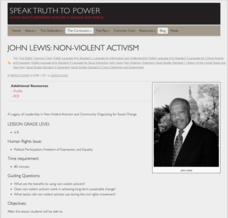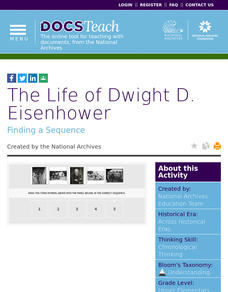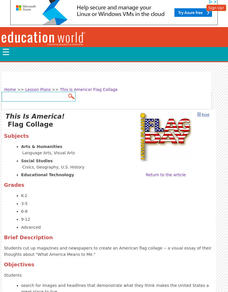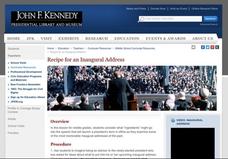DocsTeach
Analyzing a Letter About American Indian Voting Rights
An informative activity focuses on the law preventing Native Americans from voting until 1947. Scholars read documents from the Office of Indian Affairs, complete an online worksheet, and participate in group discussion. Academics learn...
Franklin D. Roosevelt Presidential Library & Museum
What Does It Mean to Be an American?
A series of four activities focuses young scholars' attention on what it means to be an American. They identify key qualities, values, and virtues they consider shared by Americans. Participants then pretend they have been selected to...
Franklin D. Roosevelt Presidential Library & Museum
The Power of Propaganda in Shaping Civic Actions and Understanding
Propaganda posters are powerful. Using images from The Art of War: American Poster Art 1941-1945 exhibit, young historians analyze the symbols, images, colors, and text used to rally support for World War II. Through seven activities,...
Speak Truth to Power
John Lewis: Non-Violent Activism
After comparing and contrasting non-violent and violent social movements, your young historians will take a closer look at the work and influence of John Lewis on the civil rights movement. They will then choose a current social...
DocsTeach
The Life of Dwight D. Eisenhower
A captivating activity uses images to help pupils understand the life of President Eisenhower. Scholars put the images in chronological order and read the captions to get a better understanding of the war hero turned president.
DocsTeach
WWI Propaganda and Art
Uncle Sam wants you! During World War II, the US government and military created a propaganda campaign to gain public support. The activity uses primary documents such as photos to explain how and why the propaganda campaign was...
US National Archives
Documented Rights Educational Lesson Plan
How have groups struggled to have their unalienable rights recognized in the United States? Acting as a research team for the Human Rights Council of the United Nations, your young historians will break into groups to research...
Franklin D. Roosevelt Presidential Library & Museum
Role Playing Relating to Big Decisions
While most high schoolers are too young to vote, they still need to learn the skills needed to solve problems. The ninth resource in a 10-part civics series presents class members with four "What Would You Do?" scenarios that have them...
iCivics
Drafting Board: Interest Groups
Does the influence of interest groups harm a political system? Your class members will analyze the role of interest groups in American politics, as well as consider the effect of perspective, bias, loyalty, and the...
DocsTeach
Martin Luther King, Jr. and the Fight for Civil Rights
Find clues to the past with photos! Young historians use a photo from one of Martin Luther King Jr.'s peaceful protests to practice photo analysis. Academics look at the image to gain clues about what is happening and why. To finish,...
iCivics
We the Jury
Learners take on the roles of jurors in a civil case to evaluate evidence and determine a verdict in this engaging online interactive experience.
Center for Civic Education
Women's History Month Word Clouds
What a great idea for celebrating Women's History Month and discovering the amazing efforts that individuals have put forth on behalf of women's rights! Learners take a closer look at the speeches and other primary source documents of...
Curated OER
This Is America! Flag Collage
In a visual essay of their thoughts about "What America Means to Me," kids of any age can create a collage about their country. Originally intended to be created physically, learners could share their projects online by using an...
John F. Kennedy Presidential Library & Museum
Recipe for an Inaugural Address
An inaugural address represents the first moments of a new beginning. Using John F. Kennedy's speech as a model for guided practice, groups examine the ingredients of an inaugural address. Individuals then repeat the analysis...
PBS
Pbs Teachers:borders American Id, Activity 2: The Internet's Impact on Politic
Investigate ways that people use the Internet to achieve political goals. Consider whether online computer use is a positive or negative influence on civic participation.
Other
Dirksen Center: Why Is It Important to Vote?
A basic right in a democracy. We know we should vote, but does our vote mean anything? Good answers to some good questions. This site provides many classroom resources.















